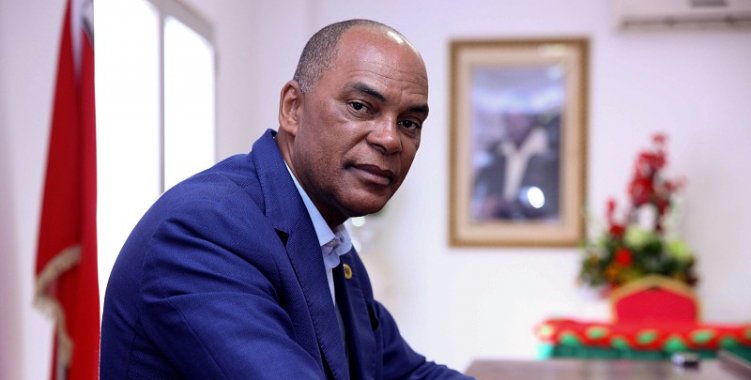In a review of the two years of the second term of President João Lourenço, who won the elections again in 2022, despite the MPLA having obtained its worst result ever, the leader of the FPU and UNITA, Adalberto Costa Júnior, drew a portrait black people in Angola today and stated that the ambition to maintain power is "destroying the nation" and "despairing" Angolans.
In front of guests, who included members of the diplomatic corps, representatives of other parties and elements of civil society and religious organizations, Adalberto Costa Júnior read a statement about the country's degradation, highlighting that the crisis in Angola has made the daily lives of the majority of Angolans "an authentic ordeal".
Adalberto Júnior considered that, despite the lack of legitimacy of the elections that gave victory to the MPLA, in power since 1975, the executive is obliged to "scrupulously comply with the program it presented to readers".
The politician stated that a combination of efforts between the FPU and the people is justified to "realize the alternation in 2027", the date on which new general elections will be held, and appealed to the nation's living forces to define a common agenda, making it available to "undertake actions of democratic pressure" and to dialogue "to find solutions" to alleviate the hunger of Angolans.
"It is necessary to leave the comfort zone", he highlighted, stating that there is a "need for mobilization to save Angola from this path of immobility" and that the FPU leaders will take to the streets in protest this week.
Regarding the declaration, he said that it is also a civic and awareness-raising act, adding that the document will be delivered to institutions "in search of institutional dialogue".
Abel Chivukuvuku, deputy coordinator of the FPU and leader of the political project PRA-JA Servir Angola, which has been trying to formalize as a political party since August 2019, highlighted that the FPU emerged as "oxygen for national politics" and has represented an extraordinary challenge for the autocratic regime that governs the country, which has tried to make its existence unfeasible, including circulating fabricated news.
With elections approaching in 2027, "they will try everything, but they won't succeed", warned the leader, who belonged to UNITA for several years and was the founder of the CASA-CE coalition, from which he was removed in 2019.
The president of the Democratic Bloc and deputy coordinator of the FPU, Filomeno Vieira Lopes, reinforced the objective of creating a "consensual agenda" with civil society, which includes points such as the fight for local authorities and the release of political prisoners, highlighting that the demonstration is also a process of democratic pressure.
"This fight has to be done, we have to change", he urged, lamenting "systematic" electoral fraud.
"We are in an autocratic state with an extremely high security bias, it takes a combination of efforts", he insisted.
Francisco Viana, member of civil society and also deputy coordinator of the FPU, highlighted that local authorities are "a right of the Angolan people" and it is necessary to fight for it, through the mobilization of civil society.
He also left messages for the diplomats present, lamenting that Western society, which supports Ukraine, in Africa does not support democracy.
"How does Biden defend democracy in Ukraine and support a dictator in Angola", he asked, asking them to start looking at the Angolan people, "who are tired", under penalty of the emergence of "instability" in the country.
In his diagnosis of Angola's degradation, Adalberto Costa Júnior criticized the executive's performance, pointing out the increase in poverty, the "chaotic state" of health and "decadent" education, but also economic policies that resulted in high inflation and currency devaluation. , which were reflected in the drastic reduction in purchasing power, combined with "unrestrained spending" and a lack of transparency in public procurement.
Criticism also targeted the "misappropriation" of funds from the General State Budget, in the form of additional credits, which served to support the political campaigns of the party in power and to "buy the conscience of journalists" and the media. public or linked to the regime.
It also focused on "proliferating actions of political intolerance", whose authors always go unpunished, citing attacks against UNITA deputies and vandalization of Democratic Bloc headquarters, highlighting the "subversion of the democratic State and the rule of law", with police officers and services of State security subject to "superior orders" contrary to the Constitution and the law.
"It's just dictatorship and propaganda here", he criticized, lamenting the "dilatory maneuvers" to postpone the institutionalization of local authorities and calling for political reforms, the revision of the Constitution to allow the direct election of the President of the Republic and the de-partisanship of the media and judicial and electoral systems.
"We must fight for the institutionalization of local authorities, preventing the regime from escaping from fulfilling this commitment", continued the president of UNITA, stressing that everyone has the obligation to demand promises from the executive such as the creation of 500 thousand jobs or the construction of lines Malanje/Lunda Norte, Lunda Norte/Lunda Sul and Lunda Sul/Moxico railways.







